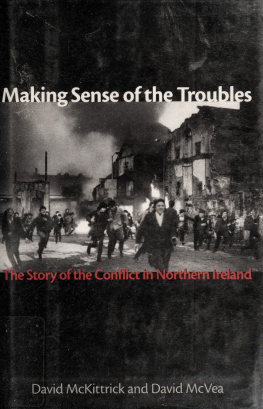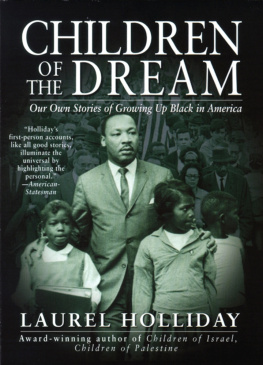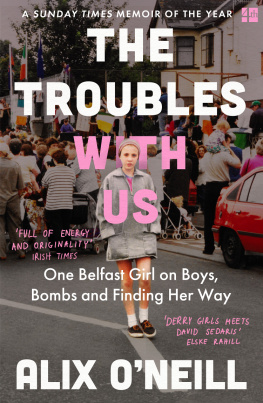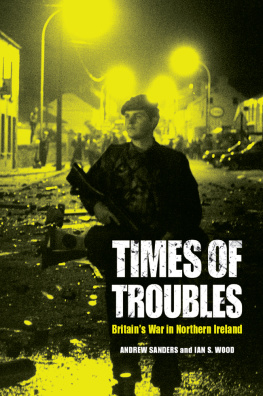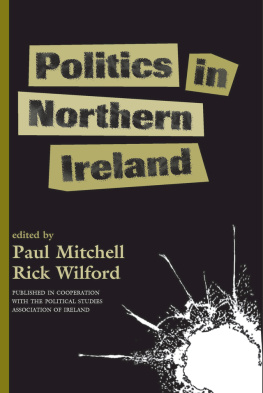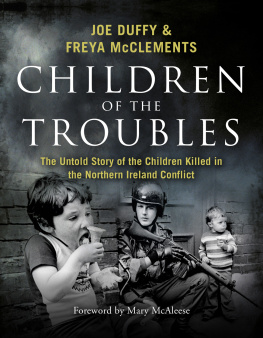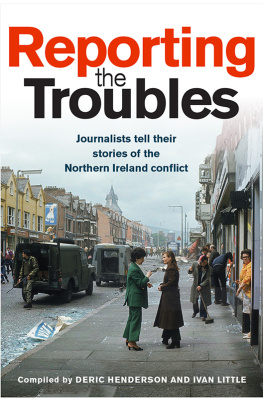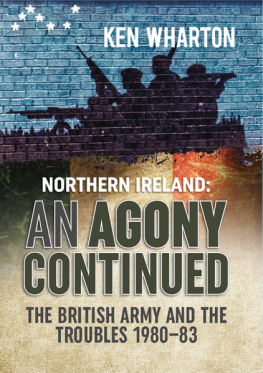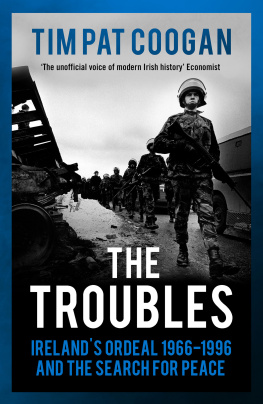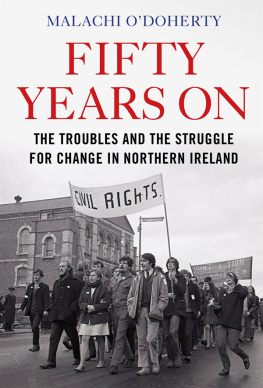David McKittrick - Making Sense of the Troubles: The Story of the Conflict in Northern Ireland
Here you can read online David McKittrick - Making Sense of the Troubles: The Story of the Conflict in Northern Ireland full text of the book (entire story) in english for free. Download pdf and epub, get meaning, cover and reviews about this ebook. year: 2002, publisher: New Amsterdam Books, genre: Politics. Description of the work, (preface) as well as reviews are available. Best literature library LitArk.com created for fans of good reading and offers a wide selection of genres:
Romance novel
Science fiction
Adventure
Detective
Science
History
Home and family
Prose
Art
Politics
Computer
Non-fiction
Religion
Business
Children
Humor
Choose a favorite category and find really read worthwhile books. Enjoy immersion in the world of imagination, feel the emotions of the characters or learn something new for yourself, make an fascinating discovery.
- Book:Making Sense of the Troubles: The Story of the Conflict in Northern Ireland
- Author:
- Publisher:New Amsterdam Books
- Genre:
- Year:2002
- Rating:4 / 5
- Favourites:Add to favourites
- Your mark:
- 80
- 1
- 2
- 3
- 4
- 5
Making Sense of the Troubles: The Story of the Conflict in Northern Ireland: summary, description and annotation
We offer to read an annotation, description, summary or preface (depends on what the author of the book "Making Sense of the Troubles: The Story of the Conflict in Northern Ireland" wrote himself). If you haven't found the necessary information about the book — write in the comments, we will try to find it.
David McKittrick: author's other books
Who wrote Making Sense of the Troubles: The Story of the Conflict in Northern Ireland? Find out the surname, the name of the author of the book and a list of all author's works by series.
Making Sense of the Troubles: The Story of the Conflict in Northern Ireland — read online for free the complete book (whole text) full work
Below is the text of the book, divided by pages. System saving the place of the last page read, allows you to conveniently read the book "Making Sense of the Troubles: The Story of the Conflict in Northern Ireland" online for free, without having to search again every time where you left off. Put a bookmark, and you can go to the page where you finished reading at any time.
Font size:
Interval:
Bookmark:

McKittrick, David, 1949
McVea, David
This book was produced in EPUB format by the Internet Archive.
The book pages were scanned and converted to EPUB format automatically. This process relies on optical character recognition, and is somewhat susceptible to errors. The book may not offer the correct reading sequence, and there may be weird characters, non-words, and incorrect guesses at structure. Some page numbers and headers or footers may remain from the scanned page. The process which identifies images might have found stray marks on the page which are not actually images from the book. The hidden page numbering which may be available to your ereader corresponds to the numbered pages in the print edition, but is not an exact match; page numbers will increment at the same rate as the corresponding print edition, but we may have started numbering before the print book's visible page numbers. The Internet Archive is working to improve the scanning process and resulting books, but in the meantime, we hope that this book will be useful to you.
The Internet Archive was founded in 1996 to build an Internet library and to promote universal access to all knowledge. The Archive's purposes include offering permanent access for researchers, historians, scholars, people with disabilities, and the general public to historical collections that exist in digital format. The Internet Archive includes texts, audio, moving images, and software as well as archived web pages, and provides specialized services for information access for the blind and other persons with disabilities.
Created with abbyy2epub (v.1.6.9)


US $27.50

'hether the new governmentsystem succeeds or fails, thereis a widespread sense that acorner has been decisively turned in NorthernIreland. It is too much to expect a future offriendship and harmony, for all of thoseinvolved have inflicted much damage on eachother. Yet it is not too much to hope that themajor campaigns of organized violence are intheir last days, and that the death toll willcontinue to decline
Compellingly written and evenhanded in itsjudgments. Making Sense of the Troubles is by farthe clearest account of what has happenedthrough the years in the Northern Irelandconflict, and why The authors, both longtimeobservers of the turbulent events, lay thebackground for the struggle in the period from1921 to 1963, a time of political stagnation andsocial exclusion between the Catholic andProtestant communities. They then chroniclethe descent into violence, the hunger strikes,the Anglo-Irish accord, the bombers inEngland, and the present-day shaky peaceprocess.
Behind the deluge of information and opinionabout the conflict from a myriad of sources is astraightforward and gripping story. DavidMcKittrick and David McVea tell that storyclearly, concisely, and above all fairly, avoidingintricate detail in favor of narrative pace andaccessible prose. They describe and explain alethal but fascinating time in Northern
(continued on back flap)
Boston Public Libraryboston, IVIA 02 il6

To our wivesand families
Digitized by the Internet Archivein 2018 with funding fromKahle/Austin Foundation
https://archive.org/details/makingsenseoftroOOdavi
1 1
ix
Introduction
The static society1921-63
The O'Neill years1963-69
Descent into violence1969-71
The end of Stormont1972-73
Sunningdale, strike & stalemate1974-76
From Castlereaqh to Warrenpoint
1977-79
The hungerstrikes1980-81
Anglo-Irish accord1982-85
Enniskillen, Libya & bombs in England1986-93
Peace process
1993- 94
Decommissioning, Docklands & Drumcree
1994- 96
Breakthrough
1997-2001 '
Perspectives
Chronology
Tables
Glossary
Bibliographical notesIndex

The observation that nothing is more remote than the recent past is particularly applicable to the Northern Ireland troubles, since the understandableinstinct of many people has been to shy away from them. For very manypeople it was a terrible period, in which a generation grew up not knowingpeace or stability.
The troubles represent a lethal but fascinating time in Irish history, bringing as they did not only death, injury and destruction but also huge political and social change. While some may argue that it may be too early for afull account of these years, there is so much material available, and so manymemories are so fresh, that we believe a proper attempt can be made tomake some sense of the troubles.
As the belief grows that the worst is past, we feel there is a need now fora review of what happened so that the mistakes of the past can be examinedand learned from. Many secrets doubtless remain to be revealed, and thereis important information which may not emerge for many years, if ever.Some events and interpretations are probably destined to be disputed for
X
Introduction
decades, yet much of the course of the troubles, if not every detail, is reasonably clear even at this early stage.
America played a major role in the Northern Ireland question over the 30years of the troubles, with many Irish-Americans lending substantial support to Irish republicans. More recently the Clinton administration in particular was highly active, Clinton himself visiting Northern Ireland nofewer than three times as president.
President Clinton took many risks in facilitating and encouraging republicans' move from violence into the political arena, at some points jeopardising America's relations with Great Britain. At his behest former USSenate majority leader George Mitchell spent many months chairing thetalks which eventually resulted in the 1998 Good Friday Agreement breakthrough. The new mood which followed terrorist attacks of September 11,2001, may have been partly instrumental in persuading the IRA to begin theactual decommissioning of weapons.
The main political events are there for all to see, as are the main characters. So too, tragically, are the more than 3,600 deaths of the troubles, deathswhose consequences are all too evident to the relatives and friends affected.Both of the authors are acutely aware of this last, since we helped write LostLives, the 1999 book which gives an account of every death. In writing thisbook it was always at the forefront of our minds that the troubles should notbe regarded simply as a period of political upheaval but also as a time whenso many lives were lost and so many people injured or bereaved. For thisreason the reader will find here a greater than usual emphasis on the deathsas well as the major political events.
The idea for a concise history of the troubles came from Blackstaff Pressof Belfast, who asked us for a clear, concise, authoritative history. We haveadhered as closely as possible to that brief. We wish to thank John Young forhis many valuable suggestions on an early draft of the text.
Next pageFont size:
Interval:
Bookmark:
Similar books «Making Sense of the Troubles: The Story of the Conflict in Northern Ireland»
Look at similar books to Making Sense of the Troubles: The Story of the Conflict in Northern Ireland. We have selected literature similar in name and meaning in the hope of providing readers with more options to find new, interesting, not yet read works.
Discussion, reviews of the book Making Sense of the Troubles: The Story of the Conflict in Northern Ireland and just readers' own opinions. Leave your comments, write what you think about the work, its meaning or the main characters. Specify what exactly you liked and what you didn't like, and why you think so.

